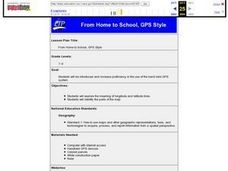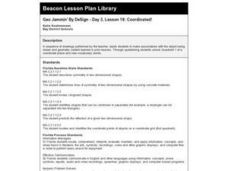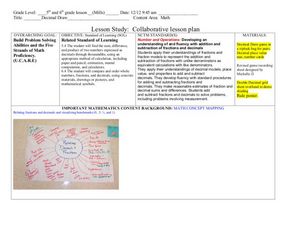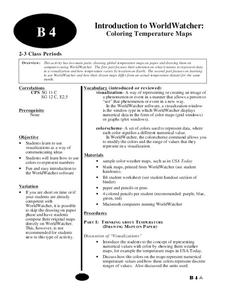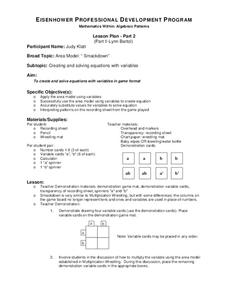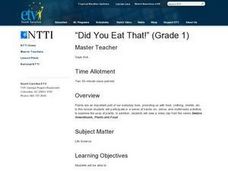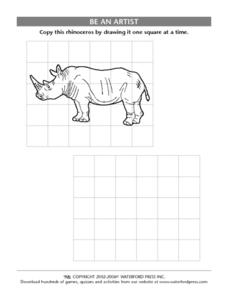Curated OER
Where Can I See The Sea?
Learners see how the pieces of the fossil puzzle fit together to allow the paleontologist to imagine the earth as it was millions of years ago. They draw a map showing what environments were present in a certain area more than 70 million...
Curated OER
Face It!
Students explore the proportions of the human face and utilize a graph to draw a self portrait based upon the techniques and styles of a variety of artists.
Curated OER
Pacific Atolls and Island Groups
Students construct, interpret and translate maps and geographic data. Given a worksheet, students identify an island, an atoll, a scale, and a compass rose. Students grid systems, legends, and symbols. They use the map to find answers to...
Curated OER
Millennium Bridge
Students read and plot coordinates in all four quadrants and state where a shape will be after translation. They explore the concept of translation using a a four quadrant grid of the of River Tyne running through all 4 quads. In...
Curated OER
Pythagorean Triples
Middle schoolers investigate the mathematical concepts related to the study of The Pythagorean Theorem. They graph and review how to use a line segment to construct a triangle. Then using the theorem students calculate the length of the...
Curated OER
What Percentage of your Class is Right or Lef Handed?
Students using their right hands, put the first letter of their last name in each square on a piece of square grid paper. Then after the 20 seconds is up, they do the same thing using their left hands.
Curated OER
From Home to School, GPS Style
Students are introduced and increase proficiency in the use of the hand held GPS system. They explore the meaning of longitude and latitude lines, then identify the parts of the map.
Curated OER
Geo Jammin By Design: Coordinated
Young scholars watch the teacher draw on the chalkboard and try to determine the form being drawn. They use questions to determine Quadrant #1 of a coordinate plane.
Curated OER
Physics: Visualization of Hydrogen Wave Functions
Students explore various methods for visualizing the results of hydrogen wave function. They observe trends using a polar plot tool and make plots for the first three energy levels of the radial wave function for hydrogen. Students apply...
Curated OER
Fourths of Sets
Students create a set of cards that represent factors of four and use these cards to play a game in which they practice separating numbers into fourths. They first practice separating numbers into fourths with a projected computer...
Curated OER
Fossils
Fourth graders act as paleontologists and attempt to figure out the environment where various fossils would have existed. They explain how fossils can be used to make inferences about past life, climate, geology, and environments.
Curated OER
May We Present Planet Earth?
High schoolers draw a map to scale. They illustrate knowledge of how to use DOGS TAILS on a map. Students identify the main parts of a map. They identify and illustrate the major features necessary for sustaining a quality of life for a...
Curated OER
Cell Community
Seventh graders use technology to review cell structure and function. In this cells less, 7th graders review the parts and functions of a cell, and use photography/video and PowerPoint to enhance their explorations.
Curated OER
Decimals: Collaborative Lesson
Students explore mathematics by participating in a group activity. In this number value lesson plan, students identify the uses for decimals and how to best estimate whole numbers based on decimals and fractions. Students collaborate...
Curated OER
Introduction to WorldWatcher: Coloring Temperature Maps
Students are introduced to the software program WorldWatcher. In groups, they discover the temperature variations throughout the world and color a map according to the temperatures. They also practice using visualization to communicate...
Curated OER
Be an Artist: Ostrich
In this science worksheet, 3rd graders will use visual clues in a grid to complete an exact image replica. Following the original line segments in each box, students will create the image of an ostrich.
Curated OER
Cutting the Wood
Students demonstrate and describe the effect of multiplying or dividing by a fraction less than or greater than one. They create and explain a variety of equivalent ratios that represent a given situation. Students draw a picture of...
Curated OER
Mathematics Within: Algebraic Patterns
Students analyze problem solving techniques for equations with variables by playing a game called "Smackdown". They place variable cards on a grid and use the area model to calculate an answer after spinning a game piece to determine the...
Curated OER
"Did You Eat That!"
First graders investigate why plants are an important part of our everyday lives, providing us with food, clothing, shelter, etc. In this lesson plan students participate in a series of hands-on, online, and multimedia activities to...
Curated OER
Great Questions for Tic Tac Toe
Fourth graders plan their own activities to reinforce the concepts being taught in school. The tic-tac-toe grid is used to help students create innovative learning activities to generate ideas.
Curated OER
Making Tangram Pieces by Folding Paper
Third graders follow directions to make a set of tangram pieces. After reading a story, they compare and contrast the differences between two-dimensional shapes. To end the lesson, they use the tangram pieces to create their own...
Curated OER
Vehicles
Students develop appropriate vocabulary for identifying types of vehicles. After viewing pictures of automobiles, students work to create a brief, accurate description of the vehicle using proper vocabulary and grammar. Students then...
Curated OER
Be an Artist: Kangaroo Rat
In this science worksheet, 3rd graders will use visual clues in a grid to complete an exact image replica. Following the original line segments in each box, students will create the image of a kangaroo rat.
Curated OER
Be an Artist: Rhinoceros
In this science worksheet, 3rd graders will use visual clues in a grid to complete an exact image replica. Following the original line segments in each box, students will create the image of a rhinoceros.








